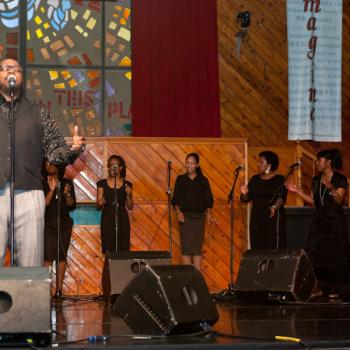Editor's Note: Below is a "Monday Sermon," our attempt at Patheos' Preachers Portal to provide sermons that pastors can enjoy and learn from. It is our hope that this particular series from Daniel Harrell, which preaches through the Church Fathers, will encourage pastors, show them a way of approaching theological education from the pulpit, and refresh their theological memories.
See Reverend Harrell's columnist page for more information.
Thomas Aquinas was among the most -- if not the most -- prolific and influential thinkers of the Middle Ages. His scholarly work fills eighteen huge volumes including commentaries on most of the books of the Bible, discussions of thirteen works of Aristotle, a host of sermons and disputations along with his most renowned work, Summa Theologica (The Totality of Theology). Though his theology transformed Roman Catholic doctrine at the 16th century Council of Trent and was declared eternally valid (!) by the pope in 1879, his contribution to Protestant theology has largely been by way of a foil against which Luther, Calvin, and the rest of the Reformers polemically parried.
Thomas Aquinas was born into a wealthy noble family, the youngest son of Count Landulf d'Aquino. He was reportedly a fat kid, albeit pious and apparently persistent. His nickname was the "Dumb Ox." His parents sent him to be raised by Benedictine monks until age 14 when he was shipped off to the University of Naples to study religion. So impressed was he by the Dominican friars who ran the university, that he decided to join their order upon graduation.
His aristocratic parents were dismayed. If their son was going to become a monk, they felt he should at least pursue the Benedictine order where their political connections could have secured Thomas the prestigious abbacy of Monte Cassino. The Dominicans would never do. Theirs was a mendicant order, shamefully dependent upon the charitable donations of parishioners to support their preaching ministry (sort of like I am). The Count and Countess, determined to save face, kidnapped Thomas, locked him in a castle, and attempted to tempt him with prostitutes and cash in order to dissuade him from becoming a preacher. None of it worked.
Aquinas went on to study in Paris and became a brilliant orator and scholar. In 1259 he returned to the Italian peninsula, where in the midst of his duties as theological advisor for the papal curia, he also found time to teach theology to young Dominicans. The Summa Theologica dates from this period. This systematic tract was intended to cultivate the preacher's ability first to ponder and then to communicate the gospel, fulfilling the Dominican ideal to contemplate and to give to others the fruits of one's contemplation. Circumstances of conflict, however, brought Aquinas back to Paris where he devoted his energies to allaying the uneasiness that the newly rediscovered philosophy of Aristotle caused among more traditional theologians. Yet at the same time, he succeeded in incorporating the best of that philosophy into the service of Christian theology.
"Thinking about the faith is always risky business," theologian Romanus Cessario of St. John's Seminary in Boston reminds us. "Some people are frightened by the prospect, and so fall back into a kind of credulous fideism that explains Christian doctrine by appeal only to the categories one finds in revelation itself. Others become intoxicated with the project, and so construct a kind of censorious rationalism that trims the supernatural content of divine revelation in order to fit the categories established by human reason. Aquinas' merit is that he succumbs to neither temptation."
On December 6, 1273, Aquinas reportedly received a spiritual manifestation so overwhelming that he declared himself able to write no longer. "The end of my labors is come," he said; "all that I have written seems to me like so much straw compared to the things that have been revealed to me." He died on March 7 of the next year.
The basic themes of Aquinas are grounded in his concept of humanity crafted in and infused with the image of divinity. Preacher Barbara Brown Taylor put it like this: "God sifts divinity into the dust, endowing it with things that belong to God alone."It is this infused image -- exhibited by intellect and will and word -- that grants us approach to God and ushers us into a perduring intimacy experienced as love, revelation, and holiness. Empowered by the Creator's grace -- also infused by way of his image and thus emanating solely from him -- human creatures are propelled onto a pilgrimage toward eternity despite the incompleteness of their nature and their sinful opposition to God's grace. Aquinas wrote,
There is understood to be an effect of God's gratuitous will in whoever is said to have God's grace. People are aided by God's gratuitous will in two ways: first, . . . as one's soul is moved by God to know or will or do something. In this way . . . "motion is the act of the mover in the moved." Secondly, people are helped by God's gratuitous will, inasmuch as . . . He infuses into such as He moves towards the acquisition of supernatural good, certain forms or supernatural qualities, whereby they may be moved by Him sweetly and promptly to acquire eternal good. . . . The gift of grace surpasses every capability of created nature, since it is nothing short of a partaking of the Divine Nature, which exceeds every other nature. And thus it is impossible that any creature should cause grace. For just as it is impossible for anything to make something fiery but fire alone, it is as necessary that God alone should sanctify, bestowing a partaking of the Divine Nature by a participated likeness.





